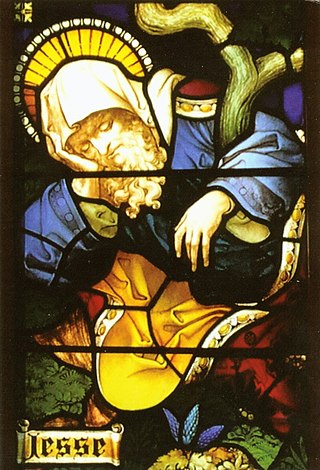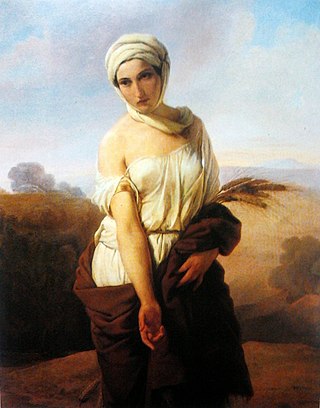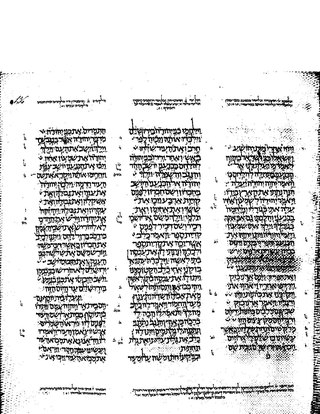The Book of Ruth is included in the third division, or the Writings (Ketuvim), of the Hebrew Bible. In most Christian canons it is treated as one of the historical books and placed between Judges and 1 Samuel.

Judah ha-Nasi or Judah I, known simply as Rebbi or Rabbi, was a second-century rabbi and chief redactor and editor of the Mishnah. He lived from approximately 135 to 217 CE. He was a key leader of the Jewish community in Roman-occupied Judea after the Bar Kokhba revolt.

Boaz is a biblical figure appearing in the Book of Ruth in the Hebrew Bible and in the genealogies of Jesus in the New Testament and also the name of a pillar in the portico of the historic Temple in Jerusalem. The word is found 24 times in the Scriptures, two being in Greek.

Jesse or Yishai ; is a figure described in the Hebrew Bible as the father of David, who became the king of the Israelites. His son David is sometimes called simply "Son of Jesse". The role as both father of King David and ancestor of Jesus has been used in various depictions in art, poetry and music e.g. as the Tree of Jesse or in hymns like "Lo, how a rose e'er blooming."

Ibzan appears in the Hebrew Bible as the ninth of the Judges of Israel.

Naomi is Ruth's mother-in-law in the Hebrew Bible in the Book of Ruth. The etymology of her name is not certain, but it is possible that it means "good, pleasant, lovely, winsome."

Naftali Zvi Yehuda Berlin, also known as Reb Hirsch Leib Berlin, and commonly known by the acronym Netziv, was an Orthodox rabbi, rosh yeshiva (dean) of the Volozhin Yeshiva and author of several works of rabbinic literature in Lithuania.
Johanan bar Nappaha was a leading rabbi in the early era of the Talmud. He belonged to the second generation of amoraim.

Yekusiel Yehudah Halberstam was a rebbe of the Hasidic dynasty of Sanz-Klausenburg.

Mahlon and Chilion or Kilion were two brothers mentioned in the Book of Ruth. They were the sons of Elimelech of the tribe of Judah and his wife Naomi. Together with their parents, they settled in the land of Moab during the period of the Israelite Judges. On foreign soil, Mahlon married the Moabite convert Ruth while Chilion married the Moabite convert Orpah.

Yisroel Hopstein (1737–1814), also known as the Maggid of Kozhnitz, was the founder of Kozhnitz Hasidism, and a noted hasidic leader in Poland during the late 18th and early 19th century. He was a student of both the Magid/Dov Ber of Mezeritch and Elimelech of Lizhensk, and wrote many books on Chassidus and Kabbalah. He is sometimes referred to as "the Avodat Yisrael" for his works.
Rabbi Yisroel Szapira of Grodzhisk was a Hasidic rebbe in Poland. His father, Chayim Meir Yechiel, was the son of the Grodzhisk Rebbe, Elimelech Szapira. When his grandfather died, some of the Chassidim chose Yisroel as the new Rebbe, others chose to wait for the young son who would eventually become the Piasezner Rebbe.
In modern Rabbinic Judaism, the traditional method of determining Jewishness relies on tracing one's maternal line. According to halakha, the recognition of someone as fully Jewish requires them to have been born to a Jewish mother. A person who is born to a non-Jewish mother and a Jewish father is regarded as Zera Yisrael and will only be accepted as ethnically Jewish and not as religiously Jewish. Thus, being Jewish through the paternal line typically necessitates conversion to Judaism to validate one's identity as a Jew in the fullest sense.

The Story of Ruth is a 1960 American historical romance film directed by Henry Koster, shot in CinemaScope and DeLuxe Color, and released by 20th Century Fox. The screenplay, written by Norman Corwin, is an adaptation of the biblical Book of Ruth. The film stars Stuart Whitman as Boaz, Tom Tryon as Mahlon, Peggy Wood as Naomi, Viveca Lindfors as Eleilat, Jeff Morrow as Tob, and introduces 19-year-old Elana Eden as Ruth.

Ruth is the person after whom the Book of Ruth is named. She was a Moabite woman who married an Israelite, Mahlon. After the death of all the male members of her family, she stayed with her mother-in-law, Naomi, and moved to Judah with her, where Ruth won the love and protection of a wealthy relative, Boaz, through her kindness. She is the great-grandmother of David.

The Land of Israel is the traditional Jewish name for an area of the Southern Levant. Related biblical, religious and historical English terms include the Land of Canaan, the Promised Land, the Holy Land, and Palestine. The definitions of the limits of this territory vary between passages in the Hebrew Bible, with specific mentions in Genesis 15, Exodus 23, Numbers 34 and Ezekiel 47. Nine times elsewhere in the Bible, the settled land is referred as "from Dan to Beersheba", and three times it is referred as "from the entrance of Hamath unto the brook of Egypt".

Judges 21 is the twenty-first chapter of the Book of Judges in the Old Testament or the Hebrew Bible. According to Jewish tradition the book was attributed to the prophet Samuel, but modern scholars view it as part of the Deuteronomistic History, which spans in the books of Deuteronomy to 2 Kings, attributed to nationalistic and devotedly Yahwistic writers during the time of the reformer Judean king Josiah in the 7th century BCE. This chapter records the war between the tribe of Benjamin and the other eleven tribes of Israel, belonging to a section comprising Judges 17 to 21.

The episode of the Levite's concubine, also known as the Benjamite War, in Judges 19–21 concerns a Levite from Ephraim and his concubine. They travel through the Benjamite city of Gibeah and are assailed by a mob, who wish to gang-rape the Levite. He turns his concubine over to the crowd, and they rape her until she collapses. After she dies from her ill treatment, the Levite dismembers her body and presents the remains to the other tribes of Israel. Outraged by the incident, the tribes swear that none shall give his daughter to the Benjamites for marriage, and launch a war which nearly wipes out the tribe, leaving only 600 surviving men. However, the punitive expedition is overcome by remorse, fearing that it will cause the extinction of an entire tribe. To ensure the survival of the Benjamite tribe while still complying with their oath, the Levites pillage and massacre the city of Jabesh-Gilead, none of whose residents partook in the war or in the vow, and capture its 400 maidens as wives for the Benjamites. The 200 men still lacking women are subtly allowed to abduct the maidens dancing at Shiloh.

Judges 17 is the seventeenth chapter of the Book of Judges in the Old Testament or the Hebrew Bible. According to Jewish tradition the book was attributed to the prophet Samuel, but modern scholars view it as part of the Deuteronomistic History, which spans in the books of Deuteronomy to 2 Kings, attributed to nationalistic and devotedly Yahwistic writers during the time of the reformer Judean king Josiah in 7th century BCE. This chapter records the activities of Micah of Ephraim. belonging to a section comprising Judges 17 to 21.

Judges 19 is the nineteenth chapter of the Book of Judges in the Old Testament or the Hebrew Bible. According to Jewish tradition, the book was attributed to the prophet Samuel; modern scholars view it as part of the Deuteronomistic History, which spans in the books of Deuteronomy to 2 Kings, attributed to nationalistic and devotedly Yahwistic writers during the time of the reformer Judean king Josiah in 7th century BCE. This chapter records the activities of a Levite from Ephraim and his concubine, belonging to a section comprising Judges 17 to 21.














